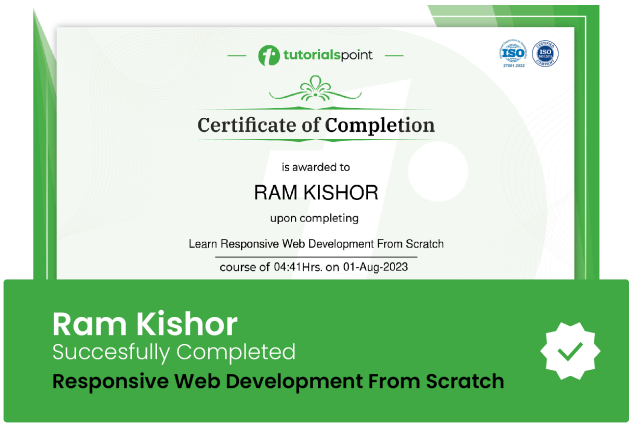Pony Programming Language
The unicorn of programming languages

Lectures -26
Duration -2.5 hours

30-days Money-Back Guarantee
Get your team access to 10000+ top Tutorials Point courses anytime, anywhere.
Course Description
Welcome,
Pony is an open-source, object-oriented, actor-model, capabilities-secure, high-performance programming language.
If you are looking to jump in and get started with Pony right now, you can try it in your browser using the Pony Playground. Keep reading if you are interested in what makes Pony different and why you should consider using it.
If you are interested in the early history of Pony and how it came into existence, you’re in luck: “An Early History of Pony”.
What makes Pony different?
Pony is type safe#
Really type safe. There’s a mathematical proof and everything.
Pony is memory safe#
There are no dangling pointers and no buffer overruns. The language doesn’t even have the concept of null!
Exception-Safe#
There are no runtime exceptions. All exceptions have defined semantics, and they are always caught.
Data-race Free#
Pony doesn’t have locks nor atomic operations or anything like that. Instead, the type system ensures at compile time that your concurrent program can never have data races. So you can write highly concurrent code and never get it wrong.
Deadlock-Free#
This one is easy because Pony has no locks at all! So they definitely don’t deadlock, because they don’t exist!
Native Code#
Pony is an ahead-of-time (AOT) compiled language. There is no interpreter nor virtual machine.
Compatible with C#
Pony programs can natively call C libraries using the foreign function interface.
Why Pony?
There’s plenty to love about Pony, but more than anything else, what we love most is that Pony makes it easy to write fast, safe, efficient, highly concurrent programs. How? The Pony type system introduces a novel concept: “reference capabilities”. Reference capabilities allow you to label different bits of data based on how that data can be shared. The Pony compiler will then verify that you are in fact correctly using the data based on the labels you provide. Reference capabilities combined with Pony’s actor model of concurrency makes for a powerful pairing. Let’s dig in and take a quick look:
Mutable state is hard#
The problem with concurrency is shared mutable data. If two different threads have access to the same piece of data then they might try to update it at the same time. At best this can lead to those two threads having different versions of the data. At worst the updates can interact badly resulting in the data being overwritten with garbage. The standard way to avoid these problems is to use locks to prevent data updates from happening at the same time. This causes big performance hits and is very difficult to get right, so it causes lots of bugs.
Immutable data can be safely shared#
Any data that is immutable (i.e. it cannot be changed) is safe to use concurrently. Since it is immutable it is never updated and it’s the updates that cause concurrency problems.
Isolated data is safe#
If a block of data has only one reference to it then we call it isolated. Since there is only one reference to it, isolated data cannot be shared by multiple threads, so there are no concurrency problems. Isolated data can be passed between multiple threads. As long as only one of them has a reference to it at a time then the data is still safe from concurrency problems.
Every actor is single threaded#
The code within a single actor is never run concurrently. This means that, within a single actor, data updates cannot cause problems. It’s only when we want to share data between actors that we have problems.
Reference capabilities enforce safe data handling#
By sharing only immutable data and exchanging only isolated data we can have safe concurrent programs without locks. The problem is that it’s very difficult to do that correctly. If you accidentally hang on to a reference to some isolated data you’ve handed over or change something you’ve shared as immutable then everything goes wrong. What you need is for the compiler to force you to live up to your promises. Pony reference capabilities allow the compiler to do just that.
If you ask us, that’s pretty damn cool and a hell of a reason to give Pony a try.
Let's learn something new.
Goals
What will you learn in this course:
The goal of this course is to give you a solid foundation of the building blocks of the language.
By the end of this course:
- You will be proficient in its datastructures, control flow.
- You will be able to create CLI applications
- You will be able to troubleshoot advanced code.
Prerequisites
What are the prerequisites for this course?
- Basic prerequisites are present, windows and linux knowledge. Basic programming knowledge.

Curriculum
Check out the detailed breakdown of what’s inside the course
Introduction
3 Lectures
-
Introduciton 01:09 01:09
-
Environment and Windows install 03:35 03:35
-
Setup on Ubuntu 04:43 04:43
The Magic
22 Lectures

The End
1 Lectures

Instructor Details

Szabo Daniel Erno
eCourse Certificate
Use your certificate to make a career change or to advance in your current career.

Our students work
with the Best


































Related Video Courses
View MoreAnnual Membership
Become a valued member of Tutorials Point and enjoy unlimited access to our vast library of top-rated Video Courses
Subscribe now
Online Certifications
Master prominent technologies at full length and become a valued certified professional.
Explore Now


 Updated on Apr, 2024
Updated on Apr, 2024
 Language - English
Language - English